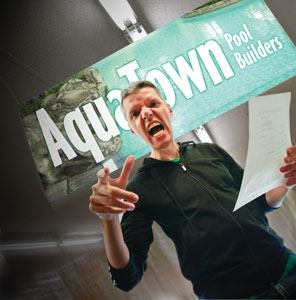To say that some homeowners have become brazen in this economy is an understatement.
Many of today’s consumers seem to think that because it’s a buyer’s market, they can name their own price.
“I’ve had more than one client say, ‘I know you just need to keep your people busy right now or you’ll lose them. So I’m giving you an opportunity to do that,’” recounts Steve Rondeau, co-owner/president of Rondo Pools, Inc. in Phoenix, a Pool & Spa News Top Builder.
“They’ll even add, ‘You’re not going to make money off me, but you’ll break even. I’m just trying to help you keep your staff.’”
Luckily, the majority of customers don’t act this way. When they do, builders often are unsure of how to address unreasonable demands and still make the sale. Follow these tips when dealing with bullying customers.
1. Set the record straight regarding costs.
One reason customers expect such smoking deals may spring from the current devaluation of homes.
“A lot of [customer attitudes] trickle down from the foreclosure market,” says Mike Giovanone, owner of Concord Pools in Latham, N.Y., a Pool & Spa News Top Builder. Consumers read the papers and suddenly think they can offer $200,000 for a $1 million home, he explains.
That mindset transfers over when they want to buy a pool; but Giovanone quickly sets the record straight.
“I tell them that home was never worth $1 million,” he says. “It was worth $400,000 and was inflated. But a pool is a pool is a pool. It’s based on costs and profit margin.”
It’s also important to clarify to the customer that, unlike a home, the price of a pool is based on a variety of factors including raw material costs, labor, design, craftsmanship and a built-in profit.
2. Explain that a pool is only as viable as the builder.
Many customers don’t understand how important it is to do business with a firm that’s financially secure.
When a builder goes bankrupt, it’s like a giant game of musical chairs — everyone scrambles for whatever resources are left, and a number of consumers end up out in the cold. That may mean an unfinished pool, a subcontractor’s lien on their home, or warranties that become worthless.
And while consumers often are taken by surprise when their pool contractor suddenly closes his doors, usually there are clues that a company is heading into freefall. One of the biggest red flags is price.
“We remind people that the companies [in our area] that were the most aggressive on price over the last five years are no longer in business,” Rondeau says.
It’s important for consumers to understand that what may seem like a great deal in the short term can result in a nightmare down the road.
3. Beat them to the punch.
There are a number of ways to handle conversations about price. But whatever method is used, experts say the topic should be brought up early.
Rondeau warns customers right off the bat that his company probably will not present the lowest bid.
“We won’t be the most expensive, but we also make it clear that we’re not the cheapest, and you get what you pay for,” he says.
For his part, Giovanone goes in the other direction. He wants customers to be aware upfront that his company is aware of the current economic situation, and has responded.
“The very first thing we do is let them know there has never been a better, more economical time to buy a Concord Pool, nor will there ever be again,” he says. “We’ll show them, ‘Here’s what pools cost two years ago, and here’s what you’re buying it for now.’”
He’s even placed signs in his showroom indicating that all prices are lower than they were three years ago.
“We address the problem before they can think we haven’t reacted to it,” Giovanone says.
4. Ask for an apples-to-apples comparison.
When looking at a bid, consumers often just go to the bottom line: price.
But not all pools are created equal, and it’s important to tell customers what they should look for when evaluating an offer. What kind of equipment is used? How about materials? Steel schedule?
Mike Geremia takes it a step further and discusses how a substandard swimming pool will affect a home’s value down the road.
“I explain that when a home is on the market, and you have a yard that’s a liability…it can cost you $35,000 or $40,000,” says the president of Geremia Pools in Sacramento, Calif., a Pool & Spa News Top Builder.
“It happens because [the homeowner] bought a product that wasn’t designed right for the yard, and it wasn’t built well.”
In addition to the actual product, it’s also helpful to discuss other aspects of a competing company, such as how long they’ve been in business, and their track record with the Better Business Bureau and state contractors board.
5. Know when to walk away.
Herb Cohen, a well-known negotiator, once said, “You have to care, really care, but not that much.”
As tempting as it is to accept a job for the temporary cash flow, sometimes it is better just to walk away. Often, taking on a project where you plan to break even or only make a tiny profit can turn into a bigger loss than anticipated. For some reason, these jobs frequently become the biggest headaches.
“That person will have [an] attitude through the entirety of the construction process,” says Bruce Dunn, president of Escondido, Calif.-based Mission Pools, a Pool & Spa News Top Builder. “And you will lose money.”
MORE INFORMATION
- Maintenance Mode
Keeping the SVRS from tripping when doing maintenance.
RELATED LINKS
- Video: Drain Retrofit
Get a step-by-step look at a spa drain cover retrofit.




